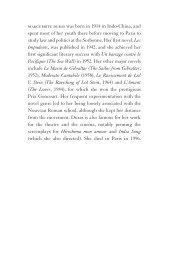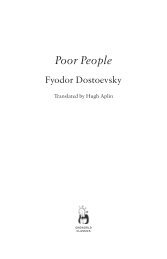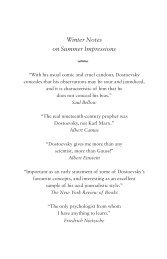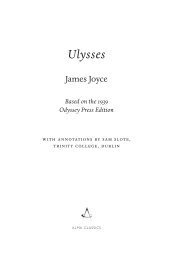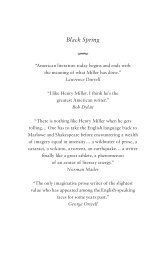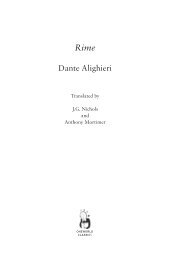Memoirs of a Good-for-Nothing - Alma Classics
Memoirs of a Good-for-Nothing - Alma Classics
Memoirs of a Good-for-Nothing - Alma Classics
You also want an ePaper? Increase the reach of your titles
YUMPU automatically turns print PDFs into web optimized ePapers that Google loves.
<strong>Memoirs</strong> <strong>of</strong> a <strong>Good</strong>-<strong>for</strong>-<strong>Nothing</strong><br />
Joseph von Eichendorff<br />
Translated by Ronald Taylor<br />
ONEWORLD<br />
CLASSICS
oneworld classics ltd<br />
London House<br />
243-253 Lower Mortlake Road<br />
Richmond<br />
Surrey TW9 2LL<br />
United Kingdom<br />
www.oneworldclassics.com<br />
<strong>Memoirs</strong> <strong>of</strong> a <strong>Good</strong>-<strong>for</strong>-<strong>Nothing</strong> first published in German in 1826<br />
First published in this translation by John Calder (Publishers) Ltd in 1966<br />
Translation © John Calder (Publishers) Limited, 1966<br />
This edition first published by Oneworld <strong>Classics</strong> Limited in 2008<br />
Front cover image © Getty Images<br />
Printed in Great Britain by Antony Rowe Ltd<br />
isbn: 978-1-84749-082-7<br />
All rights reserved. No part <strong>of</strong> this publication may be reproduced, stored in or<br />
introduced into a retrieval system, or transmitted, in any <strong>for</strong>m or by any means<br />
(electronic, mechanical, photocopying, recording or otherwise), without the prior<br />
written permission <strong>of</strong> the publisher. This book is sold subject to the condition that<br />
it shall not be resold, lent, hired out or otherwise circulated without the express<br />
prior consent <strong>of</strong> the publisher.
Contents<br />
Introduction 5<br />
Chronology 9<br />
<strong>Memoirs</strong> <strong>of</strong> a <strong>Good</strong>-<strong>for</strong>-<strong>Nothing</strong> 11<br />
Notes 122
Introduction<br />
F ew are the works that have claimed such artless and unwavering<br />
affection in their native country as Eichendorff’s Aus dem<br />
Leben eines Taugenichts (<strong>Memoirs</strong> <strong>of</strong> a <strong>Good</strong>-<strong>for</strong>-<strong>Nothing</strong>). And equally<br />
few are the writers that have been so readily and so completely identified<br />
with the <strong>for</strong>tunes <strong>of</strong> a single work as its author. To be sure, he<br />
wrote other stories, as well as dramas, verse epics and literary essays,<br />
and his lyric poetry is among the sincerest and most touching in the<br />
whole <strong>of</strong> German literature. Yet none <strong>of</strong> his other extended works<br />
has ever been taken by the German people to their hearts, while some<br />
<strong>of</strong> his best-known, most charming lyrics are in fact to be found set like<br />
jewels in the lyrical narrative <strong>of</strong> the Taugenichts. Posterity, indeed, has<br />
not judged wrongly, <strong>for</strong> the tale that the <strong>Good</strong>-<strong>for</strong>-nothing tells is a<br />
fragment <strong>of</strong> the spiritual autobiography <strong>of</strong> his creator, a presentation<br />
<strong>of</strong> the values with which the Romantics <strong>of</strong> the nineteenth century<br />
sought, in their diverse ways, to infuse their lives and their art.<br />
The real life <strong>of</strong> Joseph Freiherr von Eichendorff was very<br />
different. Born into a well-to-do family on an estate near Ratibor<br />
(now Raciborz, in Poland), he studied law, first in Halle, then in<br />
Heidelberg, where he came under the lasting influence <strong>of</strong> the German<br />
folk-song movement led by Clemens Brentano and Achim von<br />
arnim. Here, under the editorship <strong>of</strong> these two men, there appeared<br />
in 1805 and 1808 the three volumes <strong>of</strong> Des Knaben Wunderhorn, the<br />
most famous <strong>of</strong> German folk-song collections, and Eichendorff<br />
shared in the undertaking. To the years that immediately followed<br />
5
his stay in Heidelberg belong the first <strong>of</strong> his two novels and many<br />
<strong>of</strong> his finest lyrics.<br />
At the end <strong>of</strong> his university studies Eichendorff joined the<br />
Austrian, and later the Prussian, <strong>for</strong>ces in the Napoleonic<br />
campaigns, but saw no fighting. He returned to his native Silesia<br />
as a government <strong>of</strong>ficial in 1816, subsequently serving the Prussian<br />
state in Danzig, Königsberg and finally Berlin, where, as a highly<br />
esteemed administrator, he lived out the last thirteen years <strong>of</strong> his<br />
pr<strong>of</strong>essional career. In 1853 he retired to the Silesian town <strong>of</strong> Neisse,<br />
where he died four years later, little more than thirty miles from the<br />
home in which he had been born.<br />
The reasons <strong>for</strong> the popularity <strong>of</strong> Aus dem Leben eines Taugenichts<br />
are not far to seek. Its lyrical charm; its directness, its accessibility, its<br />
closeness to nature, its cheerful optimism – these are some <strong>of</strong> its more<br />
obvious endearing qualities. Of deeper and broader significance,<br />
however, are those characteristics which merge under the shadow<br />
<strong>of</strong> two vague, but none the less real, collective concepts which<br />
dominate the literature <strong>of</strong> nineteenth-century Germany: the concept<br />
<strong>of</strong> Romanticism, and the concept <strong>of</strong> German cultural nationalism.<br />
However elusive a comprehensive definition <strong>of</strong> the term “Romantic”<br />
may be, no one would question its applicability to this story, or deny<br />
the peculiarly German character <strong>of</strong> the “Romanticism”. Its praise<br />
<strong>of</strong> the joys <strong>of</strong> nature; its illumination <strong>of</strong> an ideal life governed by<br />
the power <strong>of</strong> love and the flight <strong>of</strong> fancy; its portrayal <strong>of</strong> a world in<br />
which goodness and happiness are one; the utter unrealism and antiutilitarianism<br />
<strong>of</strong> its philosophy; its enthronement <strong>of</strong> Art as the Godgiven<br />
mediator between the ephemeral “facts” <strong>of</strong> material existence<br />
and the eternal realities <strong>of</strong> the spirit; its anti-intellectualism and its<br />
faith in the heuristic power <strong>of</strong> dreams: such are the “Romantic”<br />
values, clothed in an idyllic, and sometimes embarrassingly banal,<br />
6
whimsicality <strong>of</strong> style, which the story <strong>of</strong> Eichendorff’s anti-hero<br />
transmits.<br />
In the context <strong>of</strong> nineteenth-century Germany these qualities could<br />
not but assume the role <strong>of</strong> national characteristics. Love <strong>of</strong> nature<br />
became praise <strong>of</strong> the Fatherland; the supremacy <strong>of</strong> the spirit called<br />
<strong>for</strong> a Utopian vision <strong>of</strong> national character and historical destiny; and<br />
the release <strong>of</strong> spiritual energy was to reveal in unconditional terms,<br />
through the intercession <strong>of</strong> the holy trinity <strong>of</strong> Nature, Love and<br />
Art, the true personality <strong>of</strong> the German people, the cultural ethos <strong>of</strong><br />
Deutschtum. In his aimless and <strong>of</strong>ten ill-starred wanderings, his naive,<br />
improbable exploits in the name <strong>of</strong> his love <strong>for</strong> a woman whom he<br />
takes <strong>for</strong> a countess, and his unfailing recourse to poetry and song in<br />
his moods <strong>of</strong> ecstasy, the <strong>Good</strong>-<strong>for</strong>-nothing leads – if so active a term<br />
can be used – his life in response to the dictates <strong>of</strong> this trinity.<br />
“He is <strong>of</strong> the people,” wrote Thomas Mann. “He breathes the<br />
purity <strong>of</strong> the fairy tale and the folk song… a blithe and happy symbol,<br />
touching in his modesty, <strong>of</strong> a true humanity, a cultured, Romantic<br />
humanity – in short, as I say, the humanity <strong>of</strong> Germany herself.”<br />
Above all, above the life <strong>of</strong> this gay, sunny creature, to whom<br />
every day is a Sunday and every moment a time <strong>for</strong> rejoicing,<br />
there presides a benevolent deity, a deity concerned that the<br />
blissful serenity <strong>of</strong> the <strong>Good</strong>-<strong>for</strong>-nothing shall become the lot <strong>of</strong> all<br />
mankind, and desirous <strong>of</strong> being worshipped in this image. It is the<br />
direct, uncomplicated faith <strong>of</strong> “God’s in His Heaven, all’s right with<br />
the world”. And embodied in this very directness – <strong>for</strong> the <strong>Good</strong><strong>for</strong>-nothing<br />
himself, <strong>for</strong> Eichendorff, and <strong>for</strong> the Germany <strong>of</strong> the<br />
nineteenth century – lie both its claim to universal validity and its<br />
power <strong>of</strong> ultimate persuasion.<br />
7<br />
R.T.
The text used <strong>for</strong> this translation is that in Eichendorff. Werke und<br />
Schriften. Neue Gesamtausgabe, ed. G. Baumann and S. Grosse<br />
(Stuttgart, 1957–8), Vol. II.<br />
8
Chronology<br />
1788 Born at Schloss Lobowitz, Silesia on 10th March.<br />
1805–13 Studied law at Halle, Heidelberg, Berlin and Vienna.<br />
1813 Service with the Austrian army, later with the Prussians.<br />
1814 Marriage to Luise von Larisch.<br />
1815 Ahnung und Gegenwart (novel).<br />
1816–44 Public service in the Prussian administration in Breslau,<br />
Danzig, Königsberg, and finally Berlin.<br />
1826 Aus dem Leben eines Taugenichts and Das Marmorbild<br />
(short stories, published in a single volume).<br />
1837 Das Schloss Dürande (short story). In the same year his collected<br />
poems also appeared.<br />
1846–53 Translations <strong>of</strong> dramas by Calderón de la Barca.<br />
1847 Über die ethische und religiöse Bedeutung der neueren<br />
romantischen Poesie in Deutschland (literary criticism<br />
written from the moral standpoint <strong>of</strong> a devout Catholic).<br />
1853 Residence at Neisse, in Silesia.<br />
1857 Death there on 26th November, at the age <strong>of</strong> sixty-nine.<br />
9
<strong>Memoirs</strong> <strong>of</strong> a <strong>Good</strong>-<strong>for</strong>-<strong>Nothing</strong>
1<br />
T he splashing and clattering <strong>of</strong> my father’s millwheel was<br />
again in full swing, the snow on the ro<strong>of</strong> was melting fast, and<br />
the twittering sparrows fluttered to and fro as I sat in the doorway<br />
and rubbed the sleep out <strong>of</strong> my eyes, revelling in the warm sunshine.<br />
At that moment my father came out. Since the crack <strong>of</strong> dawn<br />
he had been stomping around irritably in the mill, and now, his<br />
nightcap perched crookedly on his head, he shouted at me:<br />
“You good-<strong>for</strong>-nothing! Here you are, basking in the sun again,<br />
stretching your limbs until they ache and leaving me to do all the<br />
work by myself. I don’t see why I should keep you here any longer.<br />
Spring is just round the corner, so out you go into the world and<br />
earn your own living <strong>for</strong> a change!”<br />
“So I’m a good-<strong>for</strong>-nothing, eh?” I retorted. “All right, then. I’ll<br />
go <strong>of</strong>f and seek my <strong>for</strong>tune.”<br />
The idea was indeed very much to my liking. In autumn and<br />
winter time the yellowhammer used to sing a lament outside our<br />
window: “Farmer, please hire me! Farmer, please hire me!” But a<br />
short time ago I had seen him sitting proudly on top <strong>of</strong> the tree,<br />
singing his merry springtime song: “Farmer, keep your work!” –<br />
and this had given me the idea <strong>of</strong> making <strong>for</strong> the open road.<br />
So I went into the house and took down my fiddle – on which<br />
I was no mean per<strong>for</strong>mer, I may say. My father gave me a few<br />
coppers <strong>for</strong> the journey, and I set out down the long road that ran<br />
through the village. I smiled to myself as I saw all my old friends<br />
13
joseph von eichendorff<br />
and companions leaving <strong>for</strong> work, going out to dig and plough as<br />
they had done yesterday, the day be<strong>for</strong>e yesterday and all the days<br />
be<strong>for</strong>e that, while I was free to roam the world.<br />
With an air <strong>of</strong> pride and contentment I called out “Farewell!” to<br />
the poor folk around me, but none <strong>of</strong> them paid much heed. I felt<br />
as though every day would be like a Sunday. And when I finally got<br />
into the open country, I took out my beloved fiddle and played and<br />
sang as I walked along:<br />
“The man who in God’s favour stands,<br />
Has His command to wander free<br />
And seek the wonders <strong>of</strong> His hands,<br />
Revealed in wood and flower and tree.<br />
The listless man who sleeping lies<br />
Knows not the joy <strong>of</strong> morning’s red;<br />
He only knows <strong>of</strong> children’s cries,<br />
Of burdens, cares and daily bread.<br />
The streamlets from the mountains flow,<br />
The larks above make cheerful song;<br />
And in my joy <strong>of</strong> heart below<br />
I fain would join their happy throng.<br />
My guide in life is God alone,<br />
Who stream and lark and sea and land<br />
And earth and Heaven alike doth own:<br />
My life and fate lie in His hand.”<br />
At that moment I caught sight <strong>of</strong> an elegant carriage coming<br />
up behind me. It was travelling very slowly and must have been<br />
following me <strong>for</strong> some time, but so full was I <strong>of</strong> my song that I had<br />
not noticed it. Two aristocratic ladies were looking out and listening<br />
14
memoirs <strong>of</strong> a good-<strong>for</strong>-nothing<br />
to me. One was younger than the other and particularly beautiful,<br />
but I found both <strong>of</strong> them very attractive. When I had finished<br />
singing, the older lady bade the coachman pull up.<br />
“You seem to know some very charming songs, my good fellow,”<br />
she said in a kindly tone.<br />
“I could sing you far better ones, if you wished me to,” I returned<br />
boldly.<br />
“Where are you going so early in the morning?” she then asked.<br />
I was ashamed that I did not even know myself, so I answered<br />
boldly:<br />
“To Vienna.”<br />
The two ladies then began to talk to each other in a <strong>for</strong>eign tongue<br />
that I did not understand. The younger one shook her head a few<br />
times, but the other laughed and finally said to me:<br />
“All right! Jump up behind! We are going to Vienna too!”<br />
Who could have been happier than I! I bowed to the ladies and<br />
leapt up on to the box; the coachman cracked his whip and away we<br />
bowled along the shining road, the wind whistling round my ears.<br />
The village with its gardens and church steeples receded into<br />
the distance, and new villages, palaces and mountains hove into<br />
view. Cornfields, hedgerows and meadows flew past in dazzling<br />
succession, while the larks soared in the clear blue sky above my<br />
head. It would have embarrassed me to shout out loud, but my heart<br />
was brimming over, and I jumped up and down on the box with<br />
such delight that I almost dropped my fiddle.<br />
As the sun rose higher in the sky, heavy white clouds began to<br />
gather on the horizon, and an oppressive, empty silence settled over<br />
the broad expanse <strong>of</strong> gently waving corn. I thought <strong>of</strong> my village,<br />
<strong>of</strong> my father and his mill, <strong>of</strong> the cool shade by the side <strong>of</strong> our lake<br />
– all that was now far, far behind me. I felt a strange urge to go back;<br />
15
joseph von eichendorff<br />
then, tucking my fiddle inside my coat, I sat down pensively on the<br />
box and soon fell asleep.<br />
When I opened my eyes, the coach was standing under a group<br />
<strong>of</strong> tall linden trees, behind which a broad flight <strong>of</strong> steps, flanked by<br />
columns, led up into a magnificent palace. Through the trees at the<br />
side could be seen the spires <strong>of</strong> Vienna.<br />
The two ladies appeared to have left the coach long be<strong>for</strong>e, and<br />
the horses had been led away. I was frightened at finding myself<br />
left alone, and rushed into the palace, hearing the sound <strong>of</strong> laughter<br />
from an upper window as I did so.<br />
I had some very strange experiences in this palace. First <strong>of</strong> all, as<br />
I stood looking around me in the cool spacious vestibule, someone<br />
tapped me on the shoulder with a stick. Turning round quickly, I<br />
found myself facing a tall man in uni<strong>for</strong>m, a broad bandoleer <strong>of</strong><br />
gold silk reaching down to his waist, a silver-knobbed swagger stick<br />
in his hand, and with a remarkably large, hooked, aristocratic nose.<br />
In the puffed-up manner <strong>of</strong> a pompous turkeycock, he asked me my<br />
business there.<br />
I was completely taken aback, and in my fear and trembling I<br />
could not utter a word. A number <strong>of</strong> servants came running from<br />
upstairs and downstairs, and looked me silently up and down. Then<br />
a chambermaid – as I later learnt she was – came up to me and<br />
said that I was an attractive lad, and asked on behalf <strong>of</strong> her mistress<br />
whether I would like a job in the palace as a gardener’s boy.<br />
I felt in my pocket, but my few coppers had gone: they must have<br />
fallen out while I was dancing about on the coach. The only thing<br />
I had left was my fiddle, and the man with the swagger stick had<br />
already said that he would not have given me a farthing <strong>for</strong> it.<br />
So, with great trepidation, I answered the chambermaid that<br />
I would, still looking out <strong>of</strong> the corner <strong>of</strong> my eye at the sinister<br />
16
memoirs <strong>of</strong> a good-<strong>for</strong>-nothing<br />
figure moving majestically to and fro in the vestibule like the great<br />
pendulum <strong>of</strong> a public clock.<br />
At last the gardener arrived, mumbling something about rascals<br />
and country bumpkins, and took me out into the park, giving me<br />
a lengthy lecture as he did so. I was instructed to be sober and<br />
industrious, and not to wander about aimlessly or waste my time<br />
in unproductive activities: if I heeded this counsel, he said, I might<br />
in time achieve something. He gave me much other useful and<br />
well-phrased advice too, but I have since <strong>for</strong>gotten almost all<br />
<strong>of</strong> it. Indeed, I can barely recall how the whole situation came<br />
about, only that I said yes to everything. I felt like a bird that has<br />
been doused with water. But at least, praise God, I now had an<br />
occupation.<br />
Life was pleasant in the park. I was given a generous meal every<br />
day and more than enough money to buy wine with, but there was<br />
un<strong>for</strong>tunately a good deal <strong>of</strong> work to do as well. I liked the temples<br />
and groves and attractive avenues, and would have gladly strolled<br />
along them at my leisure, and carried on enlightened conversation<br />
like the fine gentlemen and ladies who came there every day.<br />
Whenever the gardener went away, I used to take out my little<br />
pipe, sit down and think up fine, genteel phrases that I would have<br />
used if I had been a nobleman and able to saunter around with the<br />
lovely young lady who had brought me to the palace.<br />
On quiet, sultry afternoons I would lie on my back and listen<br />
to the buzzing <strong>of</strong> the bees, watching the clouds sail past in the<br />
direction <strong>of</strong> my village, while the grass and the flowers swayed to<br />
and fro in the breeze. I would think <strong>of</strong> my lady and picture her<br />
walking through the distant garden with her guitar or with a book<br />
– tall, serene and gracious, like an angel – so that I scarcely knew<br />
whether I was awake or dreaming.<br />
17
joseph von eichendorff<br />
One day, as I was passing a summerhouse on the way to my work,<br />
I began to sing s<strong>of</strong>tly to myself:<br />
“Where’er my footsteps wander,<br />
By mountain, field or spring,<br />
O’er hill or valley yonder,<br />
My love grows ever fonder,<br />
Fair lady, as I sing.”<br />
At that moment I caught sight <strong>of</strong> a lovely pair <strong>of</strong> bright, sparkling<br />
eyes peeping out from behind the half-drawn blinds and the flowers<br />
standing in front <strong>of</strong> the window. Startled, I did not finish my song<br />
but went on my way without looking back.<br />
One Saturday evening I was standing, fiddle in hand, at the<br />
window <strong>of</strong> my cottage, thinking <strong>of</strong> the sparkling eyes I had seen<br />
and looking <strong>for</strong>ward to the coming Sunday. Suddenly the little<br />
chambermaid came tripping along through the twilight.<br />
“My gracious mistress sends you this,” she said, “so that you can<br />
drink her health. <strong>Good</strong> night!”<br />
With this she put a bottle <strong>of</strong> wine on the window-ledge, then<br />
turned round and disappeared again behind the flowers and bushes<br />
like a lizard.<br />
I stood there <strong>for</strong> a long time looking at the bottle and wondering<br />
what to make <strong>of</strong> the incident. I had been playing my fiddle cheerfully<br />
enough be<strong>for</strong>e, but now my jubilation knew no bounds, and I sang<br />
the whole <strong>of</strong> the song about the beautiful lady, and all my other songs<br />
as well; by the time I had finished, the nightingales were awake, and<br />
the moon and the stars had long since risen above the park. It was<br />
indeed a good night – a wonderful night!<br />
No one knows what Fate holds in store – every dog has his day<br />
18
memoirs <strong>of</strong> a good-<strong>for</strong>-nothing<br />
– he who laughs last, laughs longest – the age <strong>of</strong> miracles is not past<br />
– Man proposes and God disposes: such were my rambling thoughts<br />
as I sat in the garden again the following day, smoking my pipe, and<br />
looking down at myself as I sat there I almost felt like a wastrel.<br />
Contrary to my <strong>for</strong>mer custom, I now rose very early every day,<br />
even be<strong>for</strong>e the gardener and the other labourers. The park was<br />
so beautiful at that time <strong>of</strong> day: the flowers, the fountains, the rose<br />
bushes – everything glittered like gold and jewels in the morning<br />
sunlight. In the avenues <strong>of</strong> tall beeches all was silent and cool and<br />
solemn, as in a church, and only the birds were fluttering back and<br />
<strong>for</strong>th, pecking at the sand.<br />
Right in front <strong>of</strong> the palace, just below the windows <strong>of</strong> my lovely<br />
lady’s room, stood a flowering shrub. Here I used to conceal myself<br />
each morning, looking up from between the branches, <strong>for</strong> I was<br />
afraid to show myself openly. And each day I watched her appear<br />
at the open window in her snow-white robe, still flushed and not<br />
yet fully awake. She would plait her dark-brown tresses and look<br />
out across the park with tender, sparkling eyes, or tie up the flowers<br />
that grew in front <strong>of</strong> the window; at times she would even pick up a<br />
guitar, and cradling it in her white arms sing so touchingly that my<br />
heart still feels a twinge <strong>of</strong> melancholy whenever I remember her<br />
songs – yet how long ago it all was!<br />
About a week went by in this way. But then one morning, as she<br />
was standing by the window in the stillness, a wretched fly began to<br />
buzz round my nose, making me sneeze again and again. Leaning<br />
out, she caught sight <strong>of</strong> me cowering behind the shrub. This made<br />
me feel so ashamed that <strong>for</strong> days I stayed away.<br />
Finally I ventured there again, but the windows stayed shut, and<br />
although I hid in the bushes five or six mornings in succession, she<br />
did not appear. At last I grew impatient, and plucking up courage,<br />
19
joseph von eichendorff<br />
I began every morning to walk boldly right round the palace and<br />
in front <strong>of</strong> all the windows. Yet there was still no sign <strong>of</strong> her. A<br />
few windows further on I used to see the other lady, whom I had<br />
not previously observed so closely – a fine, plump, rosy-cheeked<br />
person <strong>of</strong> proud and impressive aspect, like a tulip. I always bowed<br />
low to her, and she nodded appreciatively in return, glancing at me<br />
graciously as she did so. On one single occasion I thought I saw my<br />
lovely lady peeping out <strong>of</strong> her window from behind the curtain.<br />
Days went by and still I did not see her. No more did she come<br />
into the park, no more did she come to the window. The gardener<br />
called me a lazy rascal; I grew irritable, and saw myself as a blemish<br />
on the beauty <strong>of</strong> God’s good earth.<br />
One Sunday afternoon I was lying in the grass, watching the blue<br />
smoke rise from my pipe, annoyed with myself <strong>for</strong> not having chosen<br />
some other job, so that I could at least look <strong>for</strong>ward sometimes to<br />
making Monday into an extra holiday. The other lads had put on<br />
their best clothes and gone <strong>of</strong>f to the dance halls in a nearby part<br />
<strong>of</strong> the town. There, out in the warm summer air, people in their<br />
Sunday best were surging backwards and <strong>for</strong>wards among the<br />
brightly-lit houses and the roving barrel organs. But here was I,<br />
sitting in the park, like a bittern among the reeds at the edge <strong>of</strong> a<br />
lonely pool, rocking gently to and fro in the rowing boat that was<br />
tied up there, while the peal <strong>of</strong> the vesper bells rang out from the<br />
town and the swans drifted slowly back and <strong>for</strong>th alongside me. I<br />
was so depressed that I wished I were dead.<br />
As I sat there, I heard the sound <strong>of</strong> cheerful voices and laughter<br />
in the distance. It came nearer and nearer; I caught a glimpse <strong>of</strong><br />
red and white scarves, hats and plumes through the green branches,<br />
then suddenly a party <strong>of</strong> brightly-dressed young gallants and their<br />
ladies ran across the field towards me from the palace, with my two<br />
20
memoirs <strong>of</strong> a good-<strong>for</strong>-nothing<br />
ladies in their midst. Just as I was about to get up and run <strong>of</strong>f, the<br />
elder <strong>of</strong> the two ladies noticed me.<br />
“Well, well!” she cried, with a laugh. “Just the person we needed!<br />
We want you to row us across to the other side <strong>of</strong> the lake!”<br />
One by one the ladies climbed carefully and somewhat<br />
apprehensively into the boat with the help <strong>of</strong> their escorts, who<br />
boasted confidently <strong>of</strong> their courage on the water. When the ladies<br />
had all taken their places on the wooden seat that ran round the side<br />
<strong>of</strong> the boat, I pushed <strong>of</strong>f. One <strong>of</strong> the young gentlemen standing up at<br />
the bow began very gently to rock. The ladies were frightened and<br />
became uneasy; some even screamed. My lovely lady was sitting close<br />
to the side <strong>of</strong> the boat with a lily in her hand, and as she smiled at the<br />
ripples below her, touching them with her lily, her reflection shone<br />
in the water between the clouds and the trees, like the countenance<br />
<strong>of</strong> an angel floating gently across the deep blue firmament.<br />
As I was thus gazing at her, the second <strong>of</strong> my two ladies – the<br />
plump, cheerful one – had the idea <strong>of</strong> asking me to sing her a song<br />
during the trip. At this a young bespectacled dandy, who was sitting<br />
next to her, turned and kissed her hand.<br />
“A brilliant suggestion!” he exclaimed. “Our collections <strong>of</strong> folk<br />
songs are like museums, but a popular song as really sung by the<br />
people in the woods and the open fields is like a wild Alpine rose<br />
actually growing on an Alpine slope – the very essence <strong>of</strong> our<br />
national spirit.”<br />
I replied, however, that I did not know anything worthy <strong>of</strong> such<br />
an exalted company. Thereupon the saucy little chambermaid, who,<br />
unbeknown to me, had been standing close by with a basket full <strong>of</strong><br />
bottles and glasses, piped up:<br />
“But you know a pretty little ditty about a lovely lady!”<br />
“Then sing that!” cried the gracious lady. “Come on, strike up!”<br />
21
joseph von eichendorff<br />
I went red all over. At that moment my lovely lady looked up, and<br />
her eyes lighted on mine, sending a tremor right through my body.<br />
I delayed no longer, and taking my courage in both hands, I sang<br />
boldly and cheerfully:<br />
“Where’er my footsteps wander,<br />
By mountain, field or spring,<br />
O’er hill or valley yonder,<br />
My love grows ever fonder,<br />
Fair lady, as I sing.<br />
In Nature’s peace reclining<br />
Mid flowers rich and rare,<br />
In pensiveness repining,<br />
And countless garlands twining,<br />
I see my loved one there.<br />
Yet my flowers shall ne’er come thither:<br />
She dwells so high above.<br />
But though my garlands wither,<br />
They shall yet take from hither<br />
The memory <strong>of</strong> my love<br />
My mien conceals the very<br />
Emotion I must save:<br />
For though I seem so merry,<br />
My fate is but to bury<br />
Myself in mine own grave.”<br />
We reached the other side and the company got out <strong>of</strong> the boat.<br />
While I was singing, I had noticed that many <strong>of</strong> the young men<br />
made fun <strong>of</strong> me to the ladies, with sly glances and whispers. The<br />
man with the spectacles grasped me by the hand as he went away,<br />
22
memoirs <strong>of</strong> a good-<strong>for</strong>-nothing<br />
and mumbled something or other, while the elder <strong>of</strong> my two ladies<br />
gave me a glance <strong>of</strong> appreciation. My lovely lady had cast her eyes<br />
down during the whole <strong>of</strong> my song, and now she left without saying<br />
a word. My eyes had filled with tears while I was singing, and the<br />
words <strong>of</strong> the song sent a feeling <strong>of</strong> shame and anguish through<br />
me, <strong>for</strong> I suddenly realized how beautiful she was and how poor<br />
and despised and <strong>for</strong>saken I was myself. And when they had all<br />
disappeared behind the bushes, I could stand it no longer, and threw<br />
myself down on the grass and wept bitterly.<br />
23




